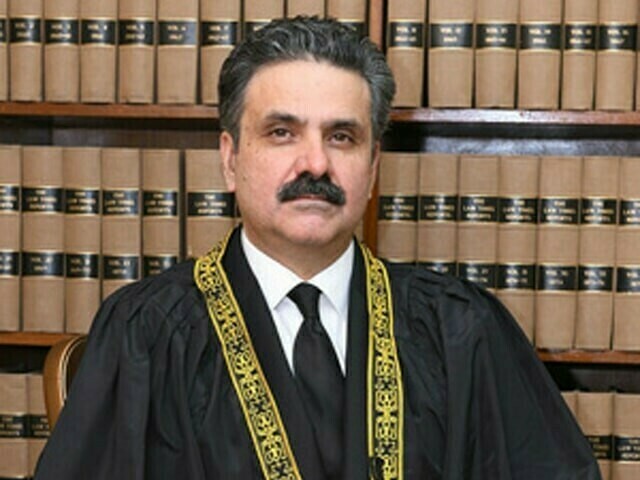ISLAMABAD: Chief Justice of Pakistan (CJP) met with the leaders of Pakistan Tehreek-e-Insaf (PTI) as part of his endeavours to take wider stakeholders consultation on the reform agenda.
Omar Ayub Khan, Leader of the Opposition in the National Assembly; Shibli Faraz, Leader of the Opposition in the Senate, Barrister Gohar Ali Khan, Barrister Ali Zafar, Barrister Salman Akram Raja, Muhammad Latif Khosa, and Dr Babar Awan met the Chief Justice at his residence on Friday, which lasted for two hours.
The chief justice had invited the Opposition leadership in the Parliament. Two days ago, he met with Prime Minister Shehbaz Sharif.
CJP takes up NJPMC meeting agenda with PM Shehbaz
After the meeting, the PTI leaders addressed a press conference in Islamabad, where Omar Ayub explained that he had obtained permission from PTI founder Imran Khan to meet with the Chief Justice. He emphasised that the party’s position on various issues was shared with CJP Afridi during the meeting.
However, according to a press release issued by the SC PRO office, CJP Yahya apprised the PTI leadership of the planned meeting of the National Judicial Policy Making Committee (NJPMC).
He informed that he met the prime minister and requested him to provide the government’s input on the reforms agenda. He said the prime minister was very positive and assured full support to the policy formulation and implementation process.
The Chief Justice also informed that the Law and Justice Commission has received input from the different Bars of the country, feedback of the citizens as well as the District Judiciary. Input of the Registrars of the High Courts and provincial judicial academies is expected soon.
He said the prime minister was concerned with the tax cases pending at various judicial forums. He said he assured the prime minister that quick disposal of tax cases, as well as, reduction of overall pendency in the Supreme Court is his high priority. The Chief Justice suggested that the judicial reform should become a Minimum Common National Agenda and the same should have bipartisan support.
Omar Ayub Khan highlighted various issues faced by the incarcerated PTI leader, Imran Khan, other leaders and workers of the party.
He complained that cases of the Opposition leadership are fixed at different locations at the same time, deliberately, so that appearance before courts become impossible; lawyers defending cases of the party leadership and the workers are being harassed; jail authorities are not complying with the orders of the courts, and terrorism cases are registered against PTI lawyers and their right to assembly and expression is being suppressed.
Ayub added that economic stability of the country hinges upon rule of law and economic recovery is only possible if the judiciary asserts itself and the executive is made accountable.
Other participants also added similar views and voiced their concerns over the deteriorating condition of law and order. They; however, recognised the fact that the judiciary needs reformation and relief to the people is possible if the district judiciary proactively deals with its pendency.
Ali Zafar requested that they need time to respond to the policy proposals shared by the Law and Justice Commission of Pakistan. They have provided valuable suggestions for improving the criminal justice system and civil dispensation. Additionally, they have indicated that further recommendations will be shared in due course.
Addressing a press conference, PTI leaders said that they urged the top justice to sort out issues in the judiciary and not to pack the Supreme Court with judges. They also raised concerns about their party workers being implicated in fabricated cases. They highlighted the lack of implementation of production orders for Members of the National Assembly and the threats faced by lawyers.
Furthermore, they pointed out the growing influence of intelligence agencies and their alleged negative role in Punjab, particularly in collaboration with the police.
Omer Ayub said they also raised the issue of missing persons in the meeting as well as that lawyers were not being allowed to meet the PTI founder and Bushra Bibi.
“In a country where the Constitution and law do not prevail, there will be no investment and the economy will not improve,” he complained, adding that unemployment and population were increasing. “When there will be no rule of law, how will things move forward,” he questioned.
He said they told the CJP they were against the 26th Constitutional Amendment, adding that they discussed production orders that were not being implemented, the issue of intimidation and threats to lawyers, as well as police brutality. “We told him, we neither want a deal nor a relaxation,” he remarked.
Salman Akram Raja also addressed the issue of military courts during the meeting, and the PTI leaders provided a detailed briefing to the Chief Justice on the issue of missing persons.
They informed him of abductions occurring in Balochistan, Sindh, and Khyber Pakhtunkhwa, specifically highlighting the dire situation in Balochistan.
In addition, Ayub said the delegation discussed the country’s economic challenges, including inflation, unemployment, and declining purchasing power. PTI leaders also raised concerns over constitutional amendments and the formation of a commission to address PTI founder Imran Khan’s letters regarding the events of May 9 and November 26.
Copyright Business Recorder, 2025




















Comments